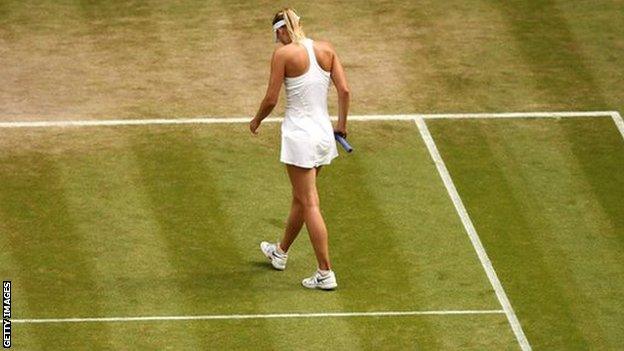Maria Sharapova: The story behind her downfall and two-year ban from tennis
- Published

Sharapova has won five Grand Slam titles - the first of which was Wimbledon in 2004
Former world number one Maria Sharapova has been banned for two years by the International Tennis Federation for using a prohibited drug. But what led to that suspension and the damning verdict of the tribunal panel?
The year after winning Wimbledon as a 17-year-old, Maria Sharapova was taken to Russia by her father to visit Moscow's Centre for Biotic Medicine.
The teenager had become prone to colds and tonsil infections. She was also feeling pain in her upper abdomen.
She was seen by Dr Anatoly Skalny, who diagnosed a mineral metabolism disorder and prescribed meldonium as part of the solution.
The drug led to Sharapova's downfall and, ultimately, to Wednesday's which so tarnishes her reputation.
Dr Skalny felt Sharapova's immune system needed a boost as her body was not getting enough nutrients from food.
He initially prescribed about 18 different medicines and supplements - a number which had risen to 30 by March 2010.
By the end of 2012, Sharapova decided there must be an alternative to taking so many pills and informed the doctor she no longer wished to work with him.
She added a nutritionist to her team, but crucially continued taking three substances recommended by the doctor.
One of those was meldonium, but it was not something Sharapova was keen to publicise. Only her father and agent knew what she was taking.
According to the 29-year-old's own evidence, the only doctor she told - in 2015 - was Dr Sergei Yanitsky of the Russian Olympic team.
Her coach, trainer, physiotherapist and nutritionist were not informed. Nor did she tell any of the Women's Tennis Association's medical staff.
Although she declared the use of other medication and vitamins on the past seven doping control forms she completed, she did not declare meldonium.
In a letter she wrote to the panel before the hearing, Sharapova admitted she took 500mg of meldonium on 18, 20, 22, 24 and 26 January this year: the days on which she played her five matches at the Australian Open.
The panel concluded that the "manner of its use, on match days and when undertaking intensive training, was only consistent with an intention to boost her energy levels... which must inevitably lead to the conclusion she took Mildronate (a brand name for meldonium) for the purpose of enhancing her performance".
Until 1 January, this was within the rules. The panel accepted Sharapova did not believe meldonium was a prohibited substance when she took it earlier this year and, therefore, determined her use of the drug was not intentional.
Archive: Sharapova reveals failed drug test
The other staggering theme of the 33-page decision handed down by the independent tribunal is the lack of care taken by Sharapova to check the legality of what she was taking.
The decision to add meldonium to the banned list for 2016 was communicated to the players electronically.
But, by her own admission, Sharapova never read the correspondence nor consulted the ITF website or wallet card provided for further information.
Her agent, Max Eisenbud, sought to take the blame.
He told the tribunal he had assumed responsibility for checking whether Sharapova's medication and supplements complied with the World Anti-Doping Agency code.
Eisenbud detailed how he had got into the habit of printing off a copy of the prohibited list for the forthcoming year and taking it with him to read on a November holiday in the Caribbean.
However, in 2015, the holiday did not take place - because Eisenbud had recently separated from his wife - and the document was never read.
The tribunal rejected his evidence, stating: "The idea that a professional manager, entrusted by IMG with the management of one of its leading global sporting stars, would so casually and ineptly have checked whether his player was complying with the anti-doping programme, a matter critical to the player's professional career and her commercial success, is unbelievable."
Sharapova testified her father had collected the meldonium from an unspecified source in Russia, but was no longer able to provide a sample of the packaging.
Her argument that no significant fault should be attached to her was dismissed by the tribunal, which concluded she was unable to "prove that she has exercised any degree of diligence".
Although the transcript of the hearing is a damning one for Sharapova, the Court of Arbitration for Sport may take a more lenient view.
Croatia's Marin Cilic and Serbia's Viktor Troicki have both had bans reduced by Cas in the past three years for doping violations.
It is a logical next step for Sharapova.
But if she is unsuccessful, the woman who won Wimbledon at 17 will not be able to compete in another Grand Slam until she is 31.
Returning to the top of the game, after such a long hiatus, would be one of Sharapova's more remarkable achievements.